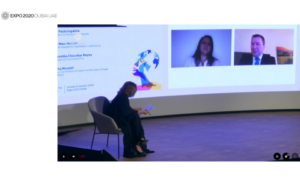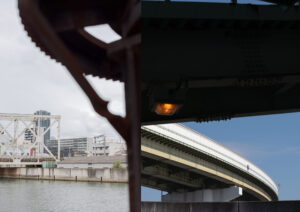Marc Hansen at the “Closing the digital divide” day at the Expo Dubai 2020
Marc Hansen, Minister delegate for Digitalisation participated virtually in the “Committed to Connecting – Government Strategies to Increase Access” flagship round-table as part of the “Closing the digital divide” day on January 9, which was organised in the context of the “Travel and Connectivity week” at the Expo Dubai 2020.
The Minister delegate for Digitalisation was joined by Marushka Chocobar Reyes, Secretary of Government and Digital Transformation of the Presidency of the Council of Ministers of Peru, to discuss what their respective countries are undertaking to close the digital gap and provide equal access to digital connectivity. Marc Hansen gave an overview of Luxembourg’s digital transformation status quo and the initiatives, which have been implemented to strengthen digital developments.
At first, the Minister Delegate for Digitalisation outlined that Luxembourg has been developing its digital infrastructure for about 20 years and offers one of the highest concentration of TIER IV type data centers in the world, and has an internationally well-known data hub. Luxembourg also offers a high-speed international connectivity thanks to more than 30 direct international connections to surrounding countries and large cities. Due to these developments, Luxembourg acquired an international reputation as data hub and has for example been chosen to host Estonia’s Data Embassy.
Additionally, Luxembourg aims at offering its citizens a state-of-the-art IT infrastructure with a target of gigabit broadband access throughout the country and thus recently defined the Broadband strategy 2021-2025 to avoid a digital divide caused by financial or geographical factors. The strategy includes the provision of connectivity for all households, regardless of their social situation, through targeted support measures. Consequently, it is estimated that, by 2025, every household should have a connection of at least 100 Mbps in download speed in order to become fully integrated into a modern society.
Luxembourg’s further efforts towards a digitally inclusive society include the creation of the Ministry for Digitalisation in 2018, by which the government gave itself the means to reinforce Luxembourg’s digitalisation with a strong focus on achieving more digital equality and accelerating digital transformation of the public sector.
To reinforce the e-government in Luxembourg, the Ministry for Digitalisation and the Government IT Center (CTIE) set up the Electronic Governance 2021-2025 strategy dedicated at offering citizens high quality online public services and to fully digitise Luxembourg’s public administration.
To support the acceleration of public services innovation, the GovTech Lab was created in 2020 by the Ministry for Digitalisation and the CTIE, combining the development of GovTech solutions and open innovation. It was designed to move forward the digital transformation of the public sector, with the objective of improving the quality of services to citizens and businesses.
The Minister Delegate for Digitalisation also presented details about the National action plan for digital inclusion, which is one of the major elements implemented by Luxembourg’s government to close the digital gap. It was defined in close consultation with an inter-ministerial working group dedicated to digital inclusion and with the help of bilateral exchanges with associations and various national NGO’s that are close to populations which may be isolated from the digital world. The plan delivers an overview of Luxembourg’s status quo and outlines strategic levers as well as concrete initiatives in order to achieve digital inclusion for every citizen. The three strategic levers are: increasing digital motivation and building digital confidence, facilitating digital access and developing digital skills.
Marc Hansen concluded by underlining that digitalisation definitely brings a paradigm shift in how we live, work, socialize etc. It has its advantages that have been clearly underlined by the ongoing COVID-19 pandemic though governments have to recognize that there are people that need support in this new digital world to be fully able to use digital devices to their advantage. As Marc Hansen put it “Digitalisation is not just about infrastructure or digital solutions, but about people.” In this sense, a holistic and collaborative approach should be reinforced to increase trust and build better and reliable capacities for citizens.
Source: Gouvernement.lu




